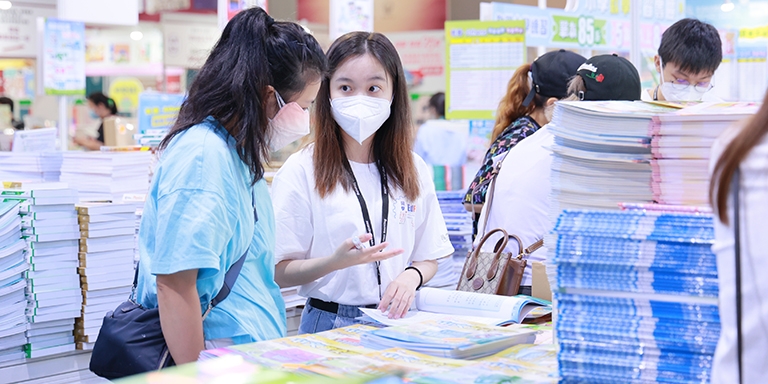The Hong Kong business community has welcomed authorities’ move to relax COVID-19 prevention requirements for arrivals, who from 12 August will need to stay in a quarantine hotel for three days followed by four days of self-isolation.
The Hong Kong Trade Development Council (HKTDC) welcomed the Hong Kong SAR (HKSAR) Government's relaxation of entry quarantine measures, which will boost Hong Kong's economic recovery and strengthen the city’s international competitiveness. The HKTDC has been supporting the city’s small-to-medium sized enterprises (SMEs) and, with the easing of quarantine measures, has set five key strategies to help SMEs capture business opportunities.
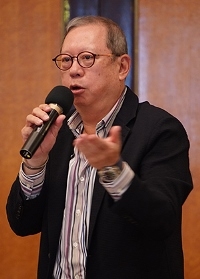
Dr Peter KN Lam, Chairman, HKTDC, said: “The new HKSAR Government brings new hope to the people of Hong Kong. We welcome the HKSAR Government’s announcement to ease quarantine measures, which strike a balance between public health and economic recovery. I believe this latest development sends a positive signal to the global community and will help drive Hong Kong's economic momentum and strengthen the city’s international competitiveness.
“As President Xi Jinping had said, Hong Kong should ride on its unique advantage as an international connector with the support of Mainland China behind it,” the chairman told a media luncheon. “I am grateful for the support of the Central Government for Hong Kong. By aligning the HKTDC’s five key strategies with the mainland’s 14th Five-Year Plan and the HKSAR Government’s policies, we can help our SMEs and start-ups turn crisis into opportunity and create prospects for our young people.”
Sustainable development
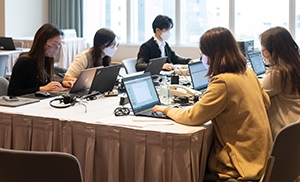
Dr Lam said the first key strategy for 2022/23 was to promote sustainable development, innovation and technology and wellness. The HKTDC would organise industry fairs and conferences to promote Hong Kong’s achievements and strengths in sustainability, innovation and technology as well as medical and wellness industries. These elements would feature across major international industry events, with matchmaking for projects in these sectors to promote commercialisation and investment opportunities for global business as well as SMEs. Relevant conferences and exhibitions include the Asia Summit on Global Health (10-11 November, 2022), the Asian Financial Forum, Asian Logistics, Maritime and Aviation Conference, Hong Kong Electronics Fair (Autumn Edition) and Eco Expo Asia, among others.
Emerging industries
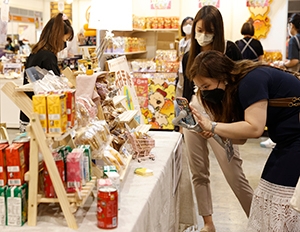
The next key strategy was to promote emerging industries and create synergy with traditional industries. The HKTDC would promote Hong Kong’s strengths in emerging industries, including medicine and healthcare, innovation and technology, creative and cultural industries and environmental industries, while creating synergy with the city’s core pillar industries, such as finance, logistics, intellectual property and manufacturing. For example, these platforms can match R&D technology with enterprises or match creative sectors with traditional manufacturers. The newly launched Exhibition Plus digital service also enables buyers and sellers worldwide to source effectively through seamless online and offline connection and matching, and ample opportunity for interaction before and after trade fairs.
Exploring markets
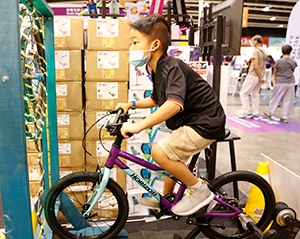
Dr Lam said the third strategy was to facilitate Hong Kong businesses in exploring markets, especially the mainland market with key focus on the Guangdong-Hong Kong-Macau Greater Bay Area (GBA). The HKTDC launched the GoGBA one-stop platform last year and the Support Scheme for Pursuing Development in the Mainland in April this year to help Hong Kong businesses address pain points when entering or operating in the mainland respectively.
“For companies tapping into overseas markets, we support them with a focus on Regional Comprehensive Economic Partnership (RCEP) markets – covering Hong Kong’s major trading partners, such as Association of Southeast Asian Nations (ASEAN) members, Japan and Korea – and mature markets such as Australia and New Zealand, with whom Hong Kong has established free trade agreements. Through events such as the Belt and Road Summit in August and through the HKTDC’s network of 50 offices around the world, we actively work with governments, business communities and enterprises to promote and reinforce Hong Kong’s position as an international business hub.
SME, start-up support
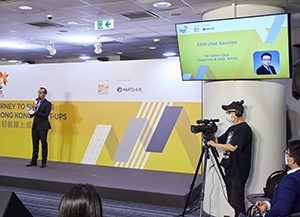
Stronger support for SMEs and start-ups in Hong Kong, including making use of government funding, was another strategy, Dr Lam stated. “We support SMEs and start-ups by providing information, large-scale online and offline events and promotion platforms as well as training programmes, such as Start-up Express for start-ups, Transformation Sandbox (T-Box) for SMEs and GoGBA for companies entering the GBA. The HKTDC also works closely with the HKSAR Government to enhance government funding schemes, including the SME Export Marketing Fund (EMF), Convention and Exhibitions Subsidy Scheme (C&E), the Branding, Upgrading and Domestic Sales (BUD Fund) and the Technology Voucher Programme (TVP).
Culture and youth
Finally, the HKTDC would align with two priorities of the new HKSAR Government – promote Hong Kong as a platform for cultural exchange and enable development opportunities for youth, Dr Lam said. The HKTDC will promote Hong Kong as a hub for cultural exchange between the mainland and the world and create business opportunities for the cultural and creative industries through exhibitions and promotions. The HKTDC would also focus on promoting collaboration between business and youth organisations by using its industry platforms.
“Our Trade Ambassador Programme (TAP) offers Hong Kong young people opportunities for exchange, learning and participation at international events, such as the Belt and Summit (later this month), which will include a thematic forum focusing on young entrepreneurs to promote entrepreneurship. the HKTDC hopes to create opportunities for young people to contribute to Hong Kong and the mainland.
So far this year, the HKTDC has held 13 exhibitions and conferences. The Hong Kong Book Fair last month (main picture) was a highlight, recording 850,000 visitors. This was followed by two jewellery fairs and the new Simply Shopping Fest, which opened up local retail opportunities for exhibitors. From Thursday this week (11 August) the Food Expo and concurrent tea, home and beauty and wellness fairs will generate more opportunities. In 2021/2022, the HKTDC organised 37 physical, online and mixed mode events, including trade fairs and conferences and public fairs. More than 8,800 local and overseas exhibitors, 488,000 trade buyers and conference participants and over 1.6 million members of the public joined these events.
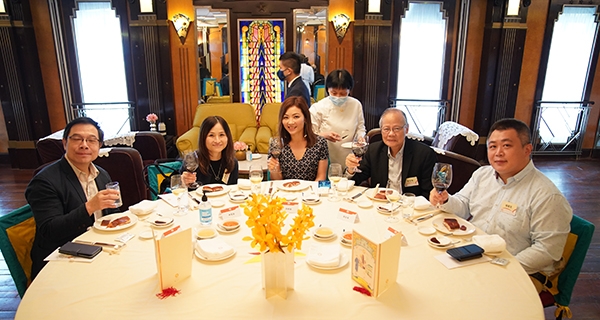
Related link
HKTDC
